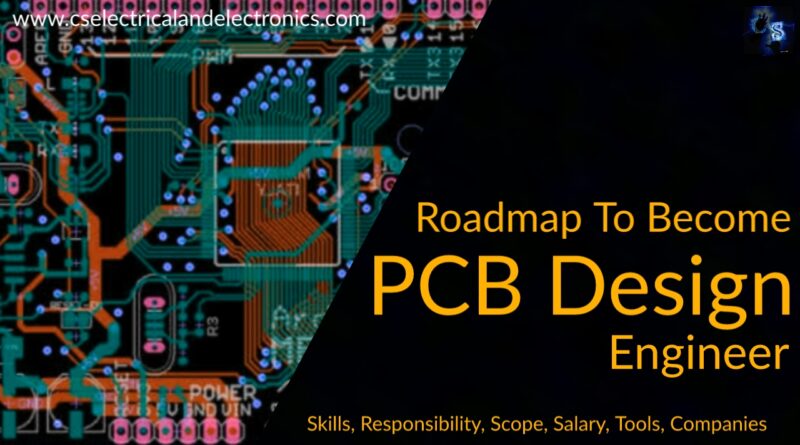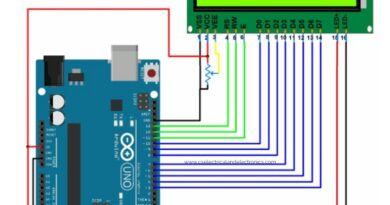Roadmap To Become A PCB Design Engineer, Skills, Tools, Salary
Hello guys, welcome back to our blog. In this article, we will discuss the roadmap to become a PCB design engineer, the skills required, the tools to design a PCB, education, and the salary of PCB designers.
If you have any electrical, electronics, or computer science doubts, then ask questions. You can also catch me on Instagram – CS Electrical & Electronics.
Also, read:
- Roadmap To Become A Software Engineer, Scope, Salary, Companies
- Roadmap To Become A Research & Development (R & D) Engineer
- Roadmap To Become A Robotics Engineer, Skills, Jobs, Responsibilities
Roadmap To Become A PCB Design Engineer
A PCB designer is a technical specialist in which a person utilizes system software applications to create circuit board layouts and cooperates with engineers to design 3D models of them. They create PCB design guidelines and draft strategies for businesses that involve schematics, assembly, and fabrication drawings. They also recognize and solve mechanical design problems and design layouts for multi-layer boards.
They also plan based on the specifications of their customers and utilize PCB design software like EasyEDA to design schematics for the PCB systems.
Usually, PCB designers do not have an upper-level degree in any particular field. But, PCB designers usually have a degree or certification in an area that involves drafting, computer-aided drawing, electronic design, hands-on printed circuit boards from FS PCBA, or other relevant areas.
Topics I will cover,
- Education Requirements of a PCB Designer
- Skills required for PCB designer
- Top 10 PCB Design Software
- Scope for a PCB Designer
- PCB Designer Responsibilities
- PCB Designer Salary
- PCB design companies in India
01. Education Requirements of a PCB Designer
PCB design is usually taught as a section of an electronic or computer design subject. Employer conditions may vary as some accept proven experience in PCB design alone, while others view a prescribed education from either a 2-year or 4-year degree curriculum. Below are some typical programs that teach PCB design.
Associate of Science Electronic Drafting and Design:
These are 2-year degree programs that offer computer drafting and design-relevant subjects, including PCB designing courses. PCB design programs concentrate on the design process, the technology or technology behind the PCB design, and PCB fabrication. Other popular courses in these programs touch upon:
- Descriptive geometry
- Mechanical drafting
- Computer design modeling
- Electronic structuring
Bachelor of Science in Electronic Engineering Technology:
Many of these 4-year degree curricula teach PCB design programs as part of the core subjects, while in some instances students can only wish to learn this skill as an elective. PCB subjects relate to lessons in computer design and may involve the physical design of the boards. Popular courses in these programs cover:
- Electronic circuits and devices
- Laboratory courses
- Electronic fabrication
- Network design and analysis
02. Skills required for PCB designer
- Performing circuit analysis
- Understanding analog filters
- Designing feedback control
- Designers should know how to manage loops function, how to maintain their effectiveness, and ensure that they are stable in behavior.
- Working with RF as IOT requires wireless connectivity and rising clock speeds turning PCB circuit traces into RF waveguides, a basic understanding of how RF signals propagate and transfer energy is proving key factor.
- Using statistics for manufacturability as statistical analysis is the tool that developers need to guarantee that their design will work in the face of uncertainty.
- Along with these technical skills, a PCB Designer should also have some fundamental business and career management skills.
03. Top 10 PCB Design Software
- Easy EDA.
- Altium Designer
- Osmond PCB
- Tiny CAD
- ExpressPCB Plus
- UpVerter
- Autodesk eagle
- DesignSpark PCB
- Fusion 360
- OrCAD PCB Designer
04. Scope for a PCB Designer
The demand for designing fields and evolving PCB technologies is rising. With more and more electronics like IoT becoming essential in day-to-day life, the prospect of electronic design is very bright. But, the requirement for experienced manufacturers of PCBs is great. Thus, the industry requires more PCB designers.
05. PCB Designer Responsibilities
- They help in designing and developing Printed Circuit Boards.
- Utilize CAD software in developing PCB assembly and schematic.
- Design PCB layouts to develop standard, dense, and high-speed circuits.
- Examine and solve design-related issues in a suitable manner.
- They also work with the project team members in learning circuit requirements and it’s limitations.
- Produce design documentation and requirements or specifications for projects.
- Give support to PCB engineering, manufacturing, and packaging teams when needed.
- Analyze and recommend changes to existing designs.
- Stay updated with the most advanced design techniques.
- Perform component employment and maintain integrity between components.
- They also conduct job training and provide support to their junior team members when needed.
06. PCB Designer Salary
The salary of a PCB design engineer depends on his or her skills. If you have the ability to create high-speed boards, then you can get a higher salary. For freshers, payroll will be low, but once you get experience, you will get a salary hike, and it depends on the company you work for. The salary of a PCB designer in India varies from Rs. 1.8 lakh to Rs. 8.2 lakh and the average salary of a PCB designer in India is 350,000 rupees per year.
07. PCB design companies in India
- Aimtron Electronics Pvt Ltd.
- Anand Industrial Enterprises Ltd.
- Argus Embedded Systems Private Limited
- Argus Technologies
- Associated electronics Research Foundation.
- Multitech Systems
- NEXTGEN Manufacturing Services Pvt. Ltd
- PCB Scientist
- PCB CAD Design
This was about the ” Roadmap To Become A PCB Design Engineer “. I hope this article, ” Roadmap To Become A PCB Design Engineer ” may help you all a lot. Thank you for reading.
Also, read:
- 100 + Electrical Engineering Projects For Students, Engineers
- 1000+ Electronics Projects For Engineers, Diploma, MTech Students
- 1000+ MATLAB Simulink Projects For MTech, Engineering Students
- 500+ Embedded System Projects For Engineer, Diploma, MTech, PhD
- 500+ Projects For Diploma Electrical, Electronics Student, Diploma Project
- 8051 Microcontroller Timers, TCON Register, TMOD Register
- Advancements In 3D Printing Technology And It’s Future
- Advancements In Power Electronics For Energy Efficiency
Author Profile
- Chetu
- Interest's ~ Engineering | Entrepreneurship | Politics | History | Travelling | Content Writing | Technology | Cooking
Latest entries
 All PostsApril 19, 2024What Is Vector CANoe Tool, Why It Is Used In The Automotive Industry
All PostsApril 19, 2024What Is Vector CANoe Tool, Why It Is Used In The Automotive Industry All PostsApril 13, 2024What Is TCM, Transmission Control Module, Working, Purpose,
All PostsApril 13, 2024What Is TCM, Transmission Control Module, Working, Purpose, All PostsApril 12, 2024Top 100 HiL hardware in loop Interview Questions With Answers For Engineers
All PostsApril 12, 2024Top 100 HiL hardware in loop Interview Questions With Answers For Engineers All PostsMarch 22, 2024Driver Monitoring Systems In Vehicles, Working, Driver Sleepy Alert
All PostsMarch 22, 2024Driver Monitoring Systems In Vehicles, Working, Driver Sleepy Alert








